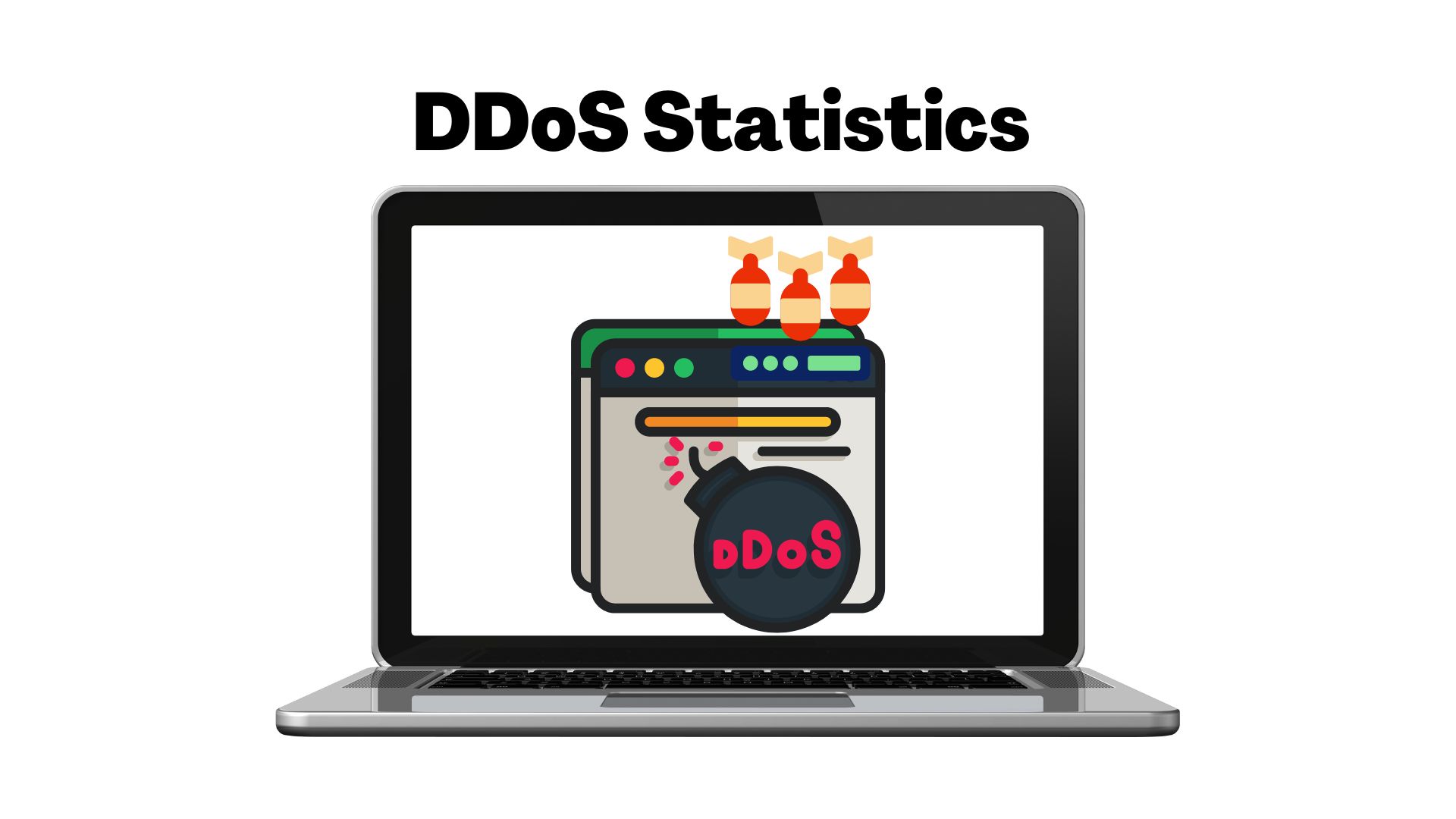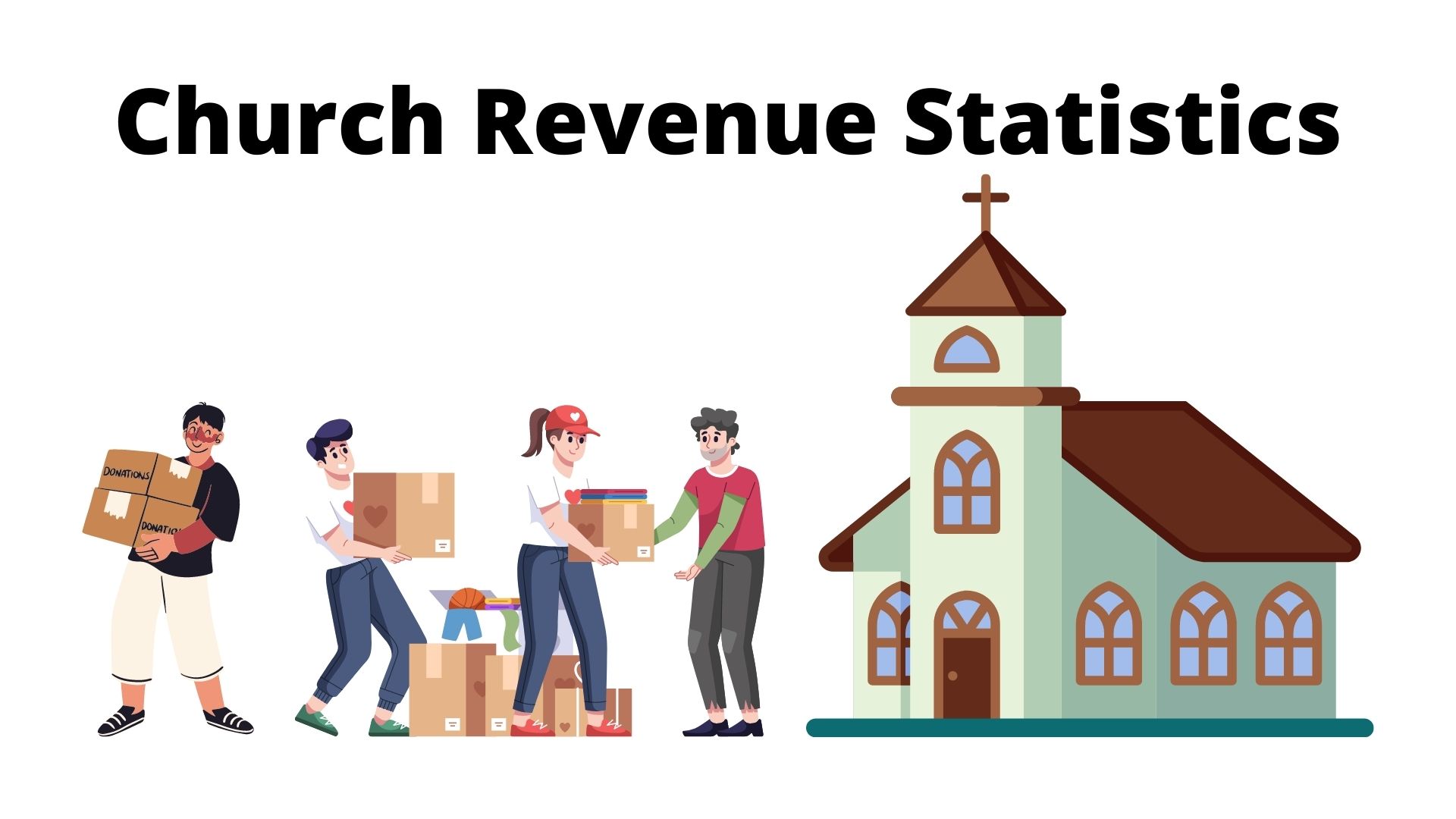15+ Stunning Employee Feedback Statistics 2023 Demographic, Engagement, Frequency and Benefits
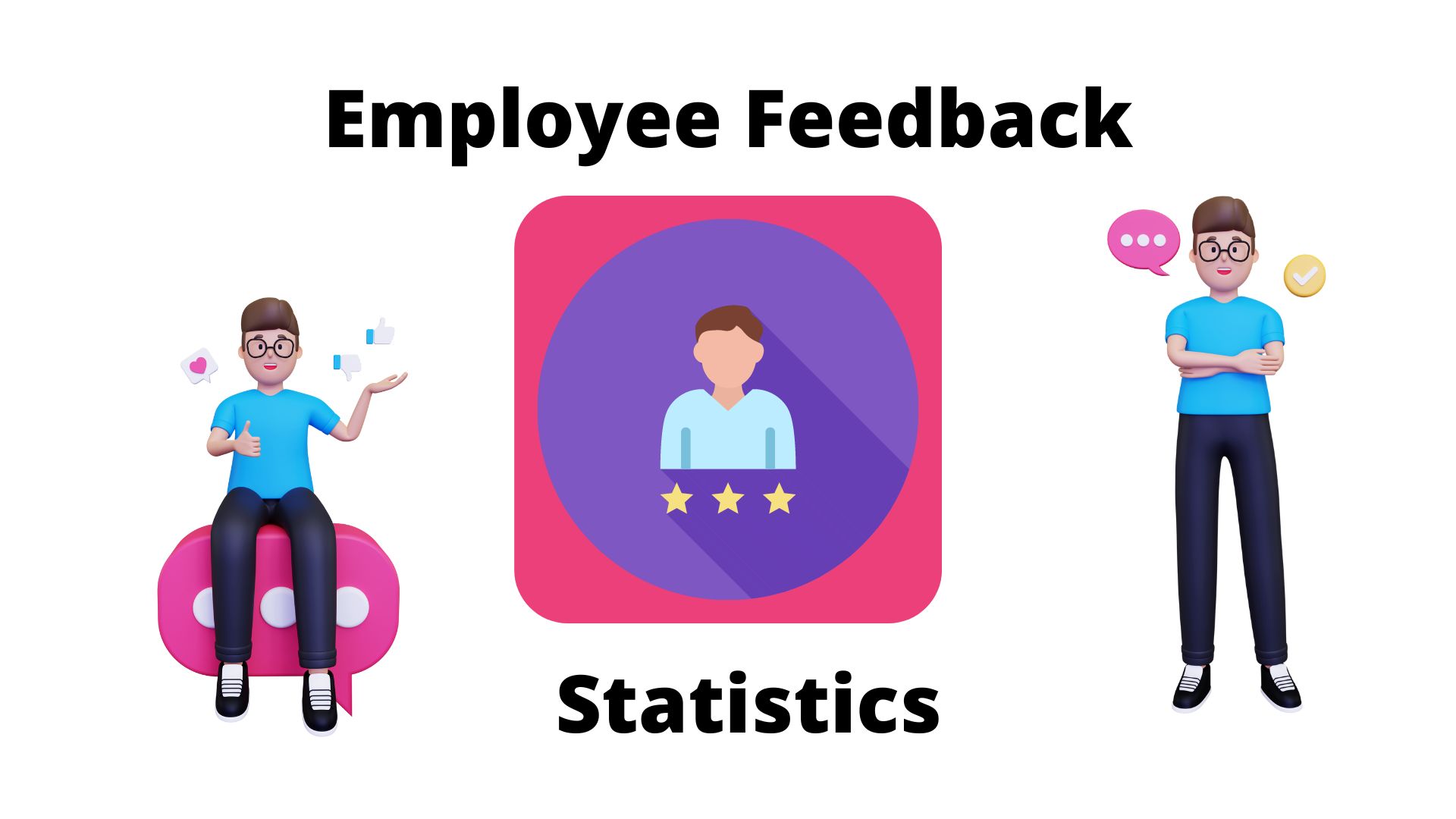
Page Contents
Employee Feedback Statistics: Employee feedback is very important in order to foster a positive work environment that encourages employees to learn, do their best, and be promoted. If feedback is given correctly, it can help companies coach their employees to become knowledgeable, more productive, and better manage their projects and subordinates.
This article will discuss the most recent facts and statistics about Employee Feedback.
Key Employee Feedback Statistics (Editor's Choice)
- Only 1% of workers who received positive feedback said they were actively disengaged compared to the 40% who did not receive feedback.
- 66% of workers would quit their jobs if they did not feel appreciated.
- 75% of workers who receive feedback believe that feedback is valuable.
- 68% of workers who get consistent and accurate feedback feel satisfied in their jobs.
- 92% of respondents concurred that giving negative redirection feedback in the right way can improve performance.
- Companies that regularly invest in employee feedback have turnover rates that are 14.9% lower than those of businesses where employees do not receive feedback.
- Most (89%) of HR leaders concur that regular peer feedback and check-ins are essential for good results.
- 69% of workers believe they would put in more effort if they thought their efforts were being acknowledged through feedback.
- 65% of workers desire more feedback.
- 98% of workers disengage from their jobs when they get little to no feedback.
- 4 out of 10 workers who get very little to no feedback are deliberately disengaged from their jobs.
- 43% of highly engaged workers receive feedback at least once per week.
- As of 2023, 39% of the employees reported to feel not being appreciated at work.
- 71% of the employees believe in 1:1 with direct managers during the onboarding journey.
- 34% of employees stated their managers don’t listen to their opinions which makes them leave their jobs.
- Companies that listen to employee feedback are 14.9% more likely to lower turnover rates.
- 5% of the employees who feel appreciated stated that they are more likely to stay with the same company for the next 2 years.
- Only 1 out of 5 employees are confident that their managers will provide feedback.
General Employee Feedback Statistics
Managers are often surprised to find how vital employee appreciation, recognition, and feedback are. Additionally, feedback creates a constructive, productive, and positive environment that encourages everyone to grow. These statistics show the potential impact that employee feedback can have on your organization.
#1. Only 1% of workers who received positive feedback said they were actively disengaged compared to the 40% who did not receive feedback.
Approximately 22% of workers who got negative feedback were disengaged. Even though this is not ideal, the level of disengagement is half that of those who got no feedback.

(Source: zippia.com)
#2. 66% of workers would quit their jobs if they did not feel appreciated.
Among millennials, this percentage increases to a startling 76%. Feedback can be supportive and constructive. In addition, managers should provide constructive and positive feedback to their staff in order to make them feel appreciated.
#3. 75% of workers who receive feedback believe that feedback is valuable.
The number of people who receive feedback is still too low, even if 75% of respondents said they thought it was necessary. Feedback is actively wanted and has a significant impact on the workplace.
#4. 68% of workers who get consistent and accurate feedback feel satisfied in their job.
For millennials, who somewhat elevate this job, nearly 72% of them find their work satisfying if they get consistent and accurate feedback.
Employee Engagement Statistics
Providing workers with constructive feedback at work is a great approach to encourage them and help them realize where and how they may grow and where their strengths lie. The following statistics show that feedback improves initiative, engagement, and motivation.
#5. Workers who feel their voice is being heard are around 4.6 times more likely to do their best work.
Employees can contribute their best ideas and work for the organization's success when they feel heard and empowered.
#6. 4 out of 10 workers who get very little or no feedback are disengaged from their jobs.
Active disengagement usually indicates that a person is prepared to quit their job or look for a new one. Employees stagnate and lose their sense of belonging when you don't provide feedback to your staff.
#7. 92% of respondents concurred that giving negative redirection feedback in the right way can improve performance.
There's no place to go if you do not know where you need to improve; as this statistic shows, many individuals agree. This is an excellent case for businesses to start a culture of constructive feedback often and early.
#8. Most (89%) of HR leaders concur that regular peer feedback and check-ins are essential for good results.
Employee appreciation is essential to developing productive workers. In addition, employees like being reminded that their work has meaning and purpose; therefore, value-based appreciation is the most crucial component of feedback.
#9. 85% of workers claim that feedback at work encourages them to be more proactive.
Approximately 73% of respondents stated that they think they are better collaborators, while 48% people said they care more about their job.

(Source: zippia.com)
Employee Feedback Frequency Statistics
Now that we are aware of the importance of employee feedback for both an individual's and a team's overall success. A lot of managers might be shocked by how frequently employees accept feedback.
#10. 80% of workers prefer feedback right away rather than aggregated feedback that can be used for bi-annual or annual reviews.
Employees desire a more collaborative process with qualitative and regular feedback.
#11. Around 28 % of employees get meaningful feedback at least once per week.
Other 28% of respondents get feedback only a few times per year, while 19% of workers get feedback just once or less every year.
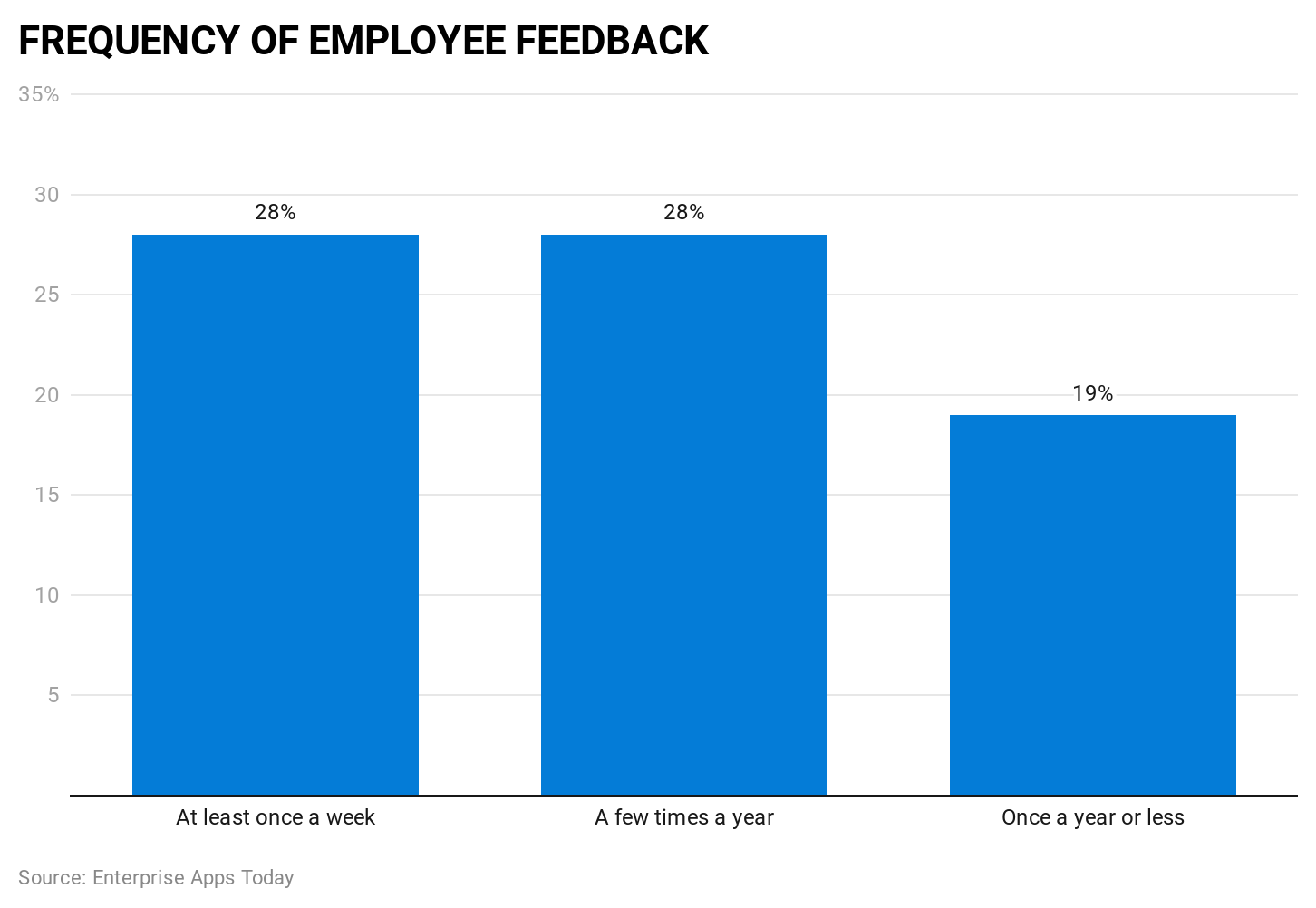
(Source: zippia.com)
#12. 77 % of HR professionals believe annual performance reviews are inaccurate representations of employee performance.
Although performance feedback reviews are frequently the same, this could not be farther from the truth. It is vital to give feedback whenever needed, not just once per year reviews, which is usually another task on a manager's list of tasks.
#13. 60% of employees said they wanted feedback on a weekly or daily basis.
The future increases to around 72% for the younger age group of employees who are under 30 years old.
Statistics By Demographic
#14. Worker feedback varies for women and men; a recent study found broad discrimination frequently occurs in performance reviews.
Women are much more likely to get critical feedback than their male counterparts. Females were more likely to get negative comments based on perceived personality traits, frequently translated as favorable traits for males.
#15. Approximately 28% of millennials desire a quarterly review, nearly 38% of people desire one annually, and 58% of baby boomers want the standard yearly review.
Millennials dislike performance reviews. Statistics show that millennials are more likely to be afraid of annual reviews. They are also more stressed by them and more likely to feel that reviews are biased. However, they are more open to changing the frequency of their feedback.
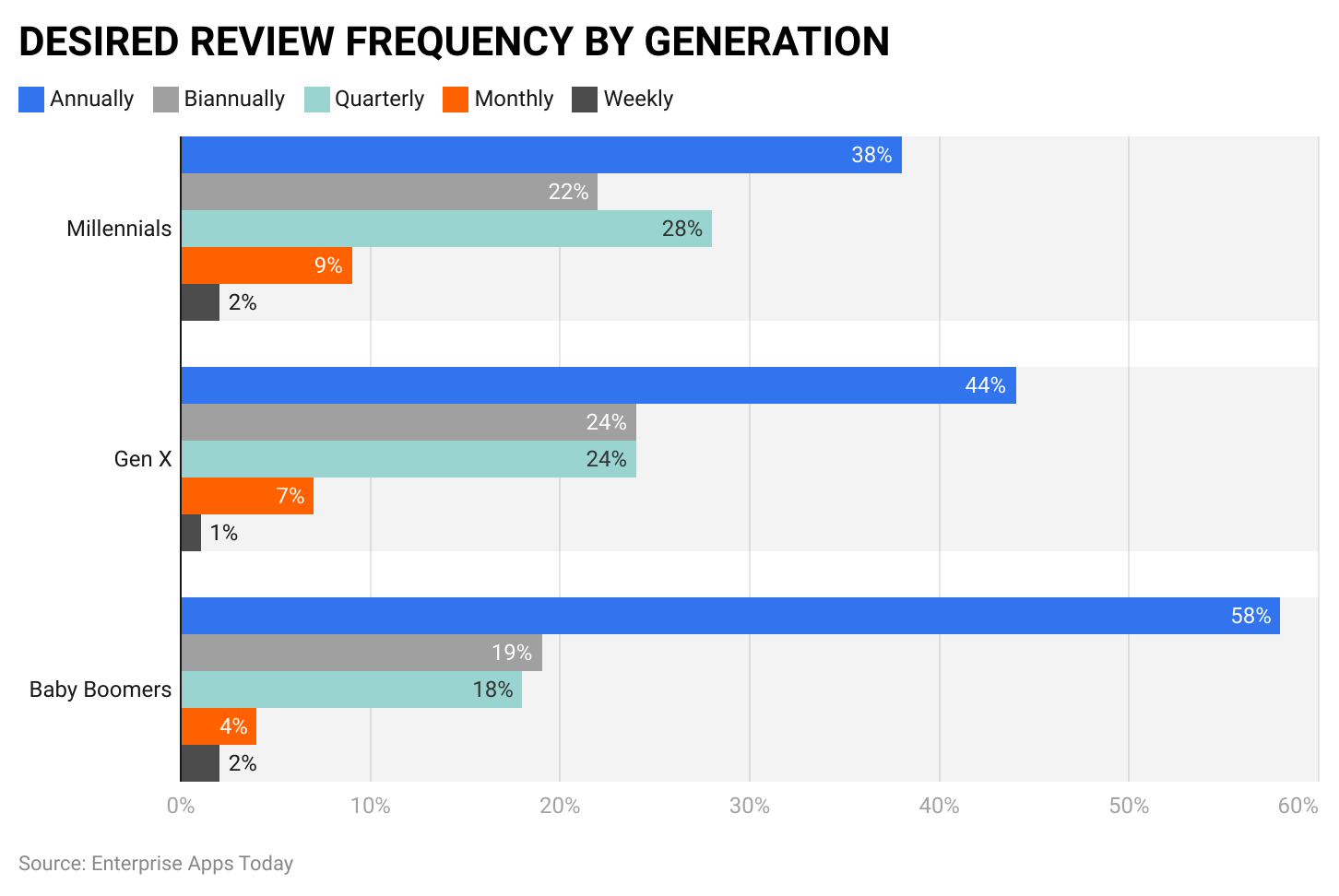
(Source: zippia.com)
Statistics By Benefits For Businesses
#16. Businesses that provided feedback to their workers had turnover rates roughly 14.9% lower than those of workers at companies that didn't provide feedback.
These people also received more feedback, and those who got strengths feedback showed around 2.5% higher productivity rates than those who didn't receive feedback.
#17. Managers who got feedback about their strengths saw 8.9% more profitability than those who did not receive feedback.
They experienced 14.9% fewer turnover rates than workers who did not receive feedback from their managers. In addition, teams with managers who got feedback about their strengths demonstrated a 12.5% higher productivity after intervention than those with managers who did not receive any feedback.
#18. Teams with high levels of engagement are 21% more profitable.
A high level of engagement is directly related to constructive and consistent feedback given to workers.
Conclusion
It is crucial to remember that worker feedback is considered any information workers share regarding their skills, performance, and abilities. You can do this either formally or informally. Also, it is vital to include both elements in your management style. Peers and supervisors should feel comfortable giving feedback to one another.
Employee feedback, when done correctly, may build a stronger, more peaceful workplace. This feedback can often open up communication lines that could otherwise be closed until the performance reviews.
Employee feedback boosts team morale, motivates staff to keep up good work, or provides constructive feedback about where they can improve. Both the employee and the company benefit from this feedback.
Sources
FAQ.
Yes, a performance appraisal may be unfair. Employees are frequently evaluated more on their cultural fit and likeability than their performance, contributions, and utility.
Unfair performance evaluations are sometimes used to force an unwanted element into a business without being held accountable for discrimination. With enough "poor" reviews, a company can defend itself from accusations of discriminatory or retaliatory termination by building a paper trail of "performance problems."
Managers don't like performance evaluations because they are inaccurate. In addition, more specifically, they don't like performance reviews since they are frequently based on factors that do not speak accurately or directly to workers' effectiveness on the job and contributions to the team. Also, forcing employees to rate their qualities numerically promotes a structured ranking system of "worst" and "best" workers, which is detrimental to employee morale.
Furthermore, a grading system indirectly infantilizes employees and adds an unnecessary layer of power dynamics within a team. As a result, many corporate cultures are moving toward more frequent, informal feedback systems because almost everyone prefers it, and it always works better.
28% of workers get meaningful feedback at least once per week, 28% of people get feedback a few times a year, and around 19% get feedback once or less a year. It's also important to note that roughly 43% of highly engaged workers get feedback at least once per week. This makes it the best frequency to provide feedback to your employee.
No, employee performance reviews generally don't work. Performance reviews are a challenging way to both receive and provide feedback because there has been so much time between them that it may not resonate with the employee when it is received. Just 14% of workers strongly agree that performance reviews motivate them to perform.
Depending on the employment relationship and situation, simple feedback should be offered at least once weekly. This includes positive feedback and minor criticism.
But, more complex feedback, such as formal reviews and surveys, should happen at least once every 3 to 6 months. This period of time leaves many opportunities for change and growth among workers without waiting too long to offer important feedback.
Yes, workers value feedback. Approximately 75% of workers think that feedback is valuable. This is because feedback can help employees gauge their work and determine how workers can improve their performance, skills, and productivity. Also, feedback supported a more open and communicative work environment.
Nearly 69% of workers want more feedback. Feedback is essential for learning, growing, and becoming productive and successful employees.
Furthermore, feedback is "higher compensation" because it's something workers want from their bosses. Overall, 48% want more compensation and honest communication. This means that feedback is crucial to nearly 35% more workers.

Barry is a lover of everything technology. Figuring out how the software works and creating content to shed more light on the value it offers users is his favorite pastime. When not evaluating apps or programs, he's busy trying out new healthy recipes, doing yoga, meditating, or taking nature walks with his little one.

